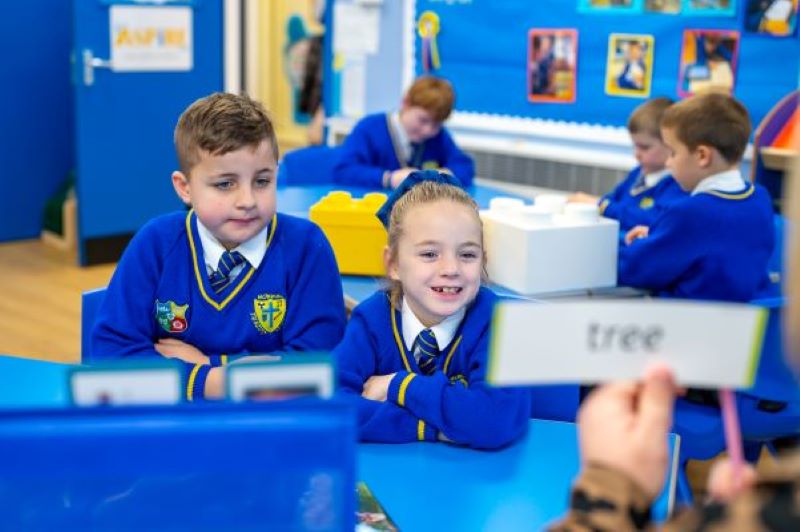
English
Curriculum Lead - Luke Smith
Intent
At Howard Junior School we believe that a quality Literacy (English) curriculum should develop children’s love of reading, writing and discussion. One of our priorities is helping children read through phonics and developing their all-important comprehension skills. We recognise the importance of nurturing a culture where children take pride in their writing, can write clearly and accurately and adapt their language and style for a range of contexts. We want to inspire children to be confident in the art of speaking and listening and who can use discussion to communicate and further their learning.
We believe that children need to develop a secure knowledge-base in literacy, which follows a clear pathway of progression as they advance through the primary curriculum. We want writing to run through the curriculum where it takes a prominent role across many different subjects. We believe that a secure basis in literacy skills is crucial to a high quality education and will give our children the tools they need to participate fully as a member of society.
Implementation
These aims are embedded across our literacy lessons and the wider curriculum. We have a developing and well-organised English curriculum and framework, that provides many purposeful opportunities for reading, writing and discussion. We use a wide variety of quality, well-matched texts and resources to motivate and inspire our children. Teachers also ensure that cross curricular links with concurrent topic work are woven into the programme of study.
The National Curriculum States that pupils should:
- read easily, fluently and with good understanding
● develop the habit of reading widely and often, for both pleasure and information
● acquire a wide vocabulary, an understanding of grammar and knowledge of linguistic conventions for reading, writing and spoken language
● appreciate our rich and varied literary heritage
● write clearly, accurately and coherently, adapting their language and style in and for a range of contexts, purposes and audiences
● use discussion in order to learn; they should be able to elaborate and explain clearly their understanding and ideas
● are competent in the arts of speaking and listening, making formal presentations, demonstrating to others and participating in debate.
At Howard Junior School, literacy lessons are taught 5 times per week, teaching skills such as: phonics, writing, reading, grammar, punctuation and spellings. A final written task is also used for assessment of a foundation subject on a half-term basis. New resources have been incorporated to enrich the literacy curriculum from the 2024-2025 academic year including: Little Wandle Phonics, FRED reading, The Write Stuff by Jane Considine and PIXL's Spelling Tracker.
The aim of Little Wandle is to use rapid catch up, with targeted children, to help bridge the reading gap between children’s current ability and age-related expectations and helping children to access the wider curriculum. This will be achieved by teaching children: GPC’s, word reading and tricky word reading until they are fluent readers. FRED reading will also be taught daily across all year groups that helps to teach important reading skills such as: retrieval, vocabulary, inference, prediction and summarising with texts to match the children’s word reading ability. FRED reading has been carefully and mapped out so it integrates well with other topics that are being taught in the curriculum at the same time. The 'Write Stuff' writing modules are half-termly, lasting between 4-5 weeks. This will include a variety of fiction and non-fiction texts and genres where the children will apply their reading, writing, speaking and listening skills. The skills that are learnt through 'sentence stacking' will then be applied in the children's independent writing at the end of the module. Once the 'Write Stuff' text is completed, it is at the teacher’s discretion to analyse the 'writing gaps' at the end of the unit and teach the gaps for the rest of the half-term as supported by 'PIXL Therapies'. Through 'PIXL's Spelling Tracker' the school will follow a progressive spelling scheme. Through exploring spelling patterns and rules, we aim to create confident and proficient spellers using a discrete teaching approach underpinned by phonics.
Children are also taught to
- Spell accurately and identify reasons for misspelling.
- Proof-read their spellings
- Recognise and use word origins, families and roots to build their skills
- Use dictionaries and thesauruses.
- Utilise synonyms and antonyms
Staff will have relevant training to ensure that they are confident in delivering the whole literacy curriculum to ensure excellent teaching and learning.
Impact
The impact on our children will be clear: progress, continued learning and transferable skills. Staff will feel empowered to teach all aspects of the literacy curriculum to ensure children are making maximum progress.
With the implementation of the writing journey being well established and taught thoroughly in lower Key Stage 2, children will become more confident writers and by the time they are in upper Key Stage 2 . Most genres of writing will be familiar to them and the teaching can focus on creativity, writer’s craft, an awareness of purposefully writing for an audience, sustained writing and manipulation of grammar and punctuation skills.
With Little Wandle Phonics, children, particularly in Year 3 and with SEN, will complete a programme in 26 weeks enabling them to become fluent readers and therefore access the whole curriculum. With FRED reading, children will have a secure grasp of comprehension skills, enabling them to understand and interpret a text holistically.

